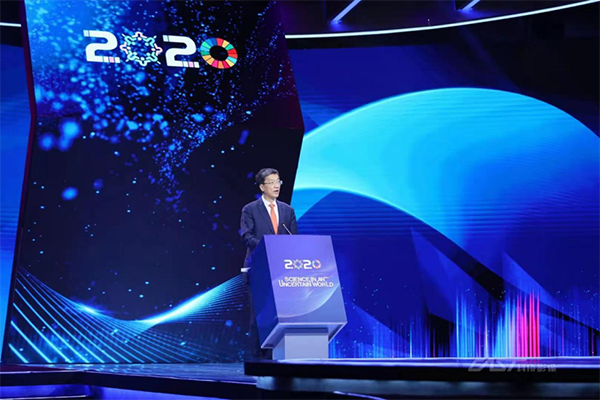A panel discussion with the theme "Science in An Uncertain World" was held in Beijing on Dec 8, 2020.
Ten Nobel Prize winners, 30 academicians around the world and young scientist representatives participated in the event, which was co-organized by the China Association for Science and Technology (CAST) and China Global Television Network. It was held both online and offline.
Huai Jinpeng, secretary of the leading Party members' group, executive vice-president, first secretary of the secretariat of CAST, and a member of the Chinese Academy of Sciences, attended the panel discussion and gave a speech.
Science literacy is the cornerstone for promoting social development and governance, Huai said. Science education and communication is a fundamental way for the public to understand science, and various communication platforms of new media, omnimedia, and integrated media can play a related role.
Huai said CAST is ready to deepen pragmatic cooperation with international counterparts in building a science literacy community to promote the recovery of the world economy and improve the global governance system.

As CAST and CGTN maintain close cooperation relationship in science and technology communication, they have produced many science popularization programs. The two sides said they plan to increase their efforts in the international dissemination of Chinese science and technology.
China's renowned respiratory disease expert Zhong Nanshan, winner of the Medal of the Republic and a member of the Chinese Academy of Engineering, sent a video message to the forum.
He said the mass prevention and control and strong intervention measures are the basis for China’s successful prevention and control of the COVID-19 pandemic, while it is scientific and technological innovation that solves the scientific problems of COVID-19.
Biomedicine is important for people's health. It is critical to use biomedicine with innovative thinking to improve people's health, as well as prevent and control diseases, especially in terms of early detection, diagnosis, and treatment, Zhong said.
During the forum, Chinese scientists, Nobel Prize winners and young scientists had a dialogue on the development prospects of young scientists, the role of science in fighting the COVID-19 pandemic, and the importance and necessity of improvement of public science literacy.
The Chinese Academy of Engineering academicians and Nobel Prize winners also discussed the role of science in addressing global challenges, the research and development of COVID-19 vaccines, the effect of traditional Chinese medicine on public health crises, and the future of clean energy.
In addition, scientists from Japan and China, and five Nobel Prize winners shared their views on science literacy among the public in a video chat.
Experts said the improvement of public science literacy across the world is very crucial to respond to global challenges, including COVID-19 and climate change.
More efforts should be made to emphasize the benefits of science to human development, in addition to the spread of the spirit of science and cultivation of the public's scientific thinking.
Scientists also need to play a more active role in increasing communication with the public. In addition, the scientific community and media should work together in regards to global scientific and technological communication, and contribute greater efforts to the world's scientific, technological and cultural exchanges.